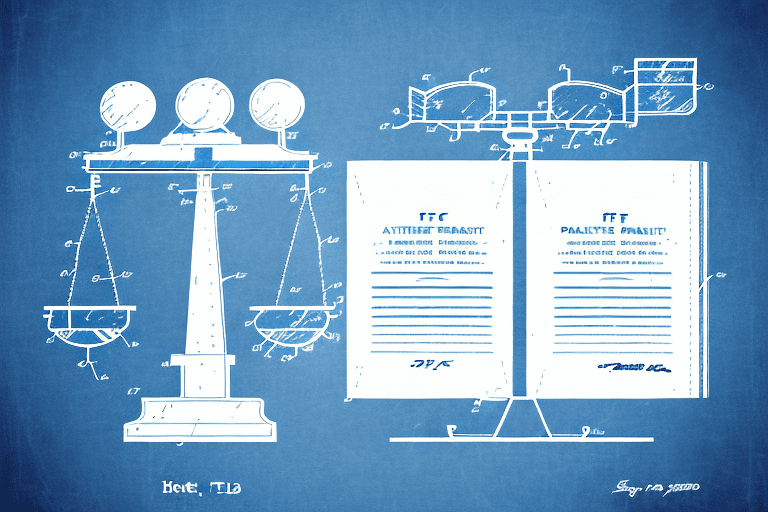Whether you’re considering a career in law or education, taking a professional examination is a significant milestone on your journey. Professional exams serve as gateways to certain professions, ensuring that individuals possess the necessary knowledge and skills to fulfill their roles effectively. In the fields of law and education, two well-known professional exams are the Patent Bar Exam and the Florida Teacher Certification Examinations (FTCE).
Understanding the Basics of Professional Examinations
Before diving into the specifics of the Patent Bar Exam and the FTCE, let’s first take a moment to understand what professional examinations are all about.
What is a Professional Examination?
A professional examination is a standardized assessment designed to evaluate the competency, knowledge, and skills of individuals seeking entry into a particular profession. These exams aim to ensure that those who pass possess the necessary qualifications to carry out their professional responsibilities.
Professional examinations are not just a test of knowledge, but also a measure of practical skills and abilities. They are typically administered by professional organizations or regulatory bodies within a specific industry. These exams are often rigorous and comprehensive, covering a wide range of topics and subject areas relevant to the profession.
One of the key purposes of professional examinations is to establish a level of credibility and trust in the professionals who hold the respective certifications. By passing these exams, individuals demonstrate their competence and commitment to their chosen field.
Importance of Professional Examinations
Professional examinations play a vital role in upholding industry standards and protecting the public interest by ensuring that professionals possess the requisite expertise. They serve as a benchmark, establishing a minimum competency level for those practicing in a specific field.
These examinations also serve as a means of professional development and continuous learning. Professionals who hold certifications are often required to maintain their knowledge and skills through ongoing education and training. This ensures that they stay up-to-date with the latest advancements and best practices in their field.
Moreover, professional examinations provide a level playing field for individuals entering a profession. They create a standardized evaluation process that allows employers and clients to assess the qualifications of candidates objectively. This helps to maintain fairness and transparency in the hiring and selection process.
Another significant benefit of professional examinations is the recognition and mobility they offer. Holding a professional certification can open doors to career advancement and opportunities for professionals. It demonstrates a commitment to excellence and can enhance credibility and marketability in the job market.
Overall, professional examinations serve as a crucial mechanism for maintaining quality standards, ensuring public safety, and promoting professional growth and development. They are a testament to the dedication and expertise of individuals in their respective fields.
An In-depth Look at the Patent Bar Exam
Now, let’s shift our focus to the Patent Bar Exam, a professional examination essential for individuals aiming to become patent attorneys or agents.
The Patent Bar Exam, officially known as the United States Patent and Trademark Office (USPTO) Registration Examination, is a comprehensive assessment that evaluates an individual’s understanding of patent laws, regulations, and procedures. This exam ensures that patent attorneys and agents possess the necessary expertise to represent clients in matters related to patents.
Passing the Patent Bar Exam is a significant achievement for aspiring patent attorneys and agents. It opens up a world of opportunities for them to work in various sectors, including law firms, corporations, government agencies, and even as solo practitioners. With the increasing importance of intellectual property rights, the demand for qualified patent professionals continues to grow.
What is the Patent Bar Exam?
The Patent Bar Exam is not an easy feat to conquer. It requires a deep understanding of patent law, as well as the ability to apply that knowledge in practical scenarios. This examination is designed to assess candidates’ competence in handling the complexities of patent law and their ability to effectively represent clients in patent-related matters.
During the exam, candidates are tested on various aspects of patent law, including patentability requirements, patent prosecution, patent litigation, and patent infringement. They are expected to demonstrate a comprehensive understanding of these topics, as well as the ability to analyze and apply legal principles to real-world situations.
Requirements for the Patent Bar Exam
In order to sit for the Patent Bar Exam, individuals must meet certain eligibility requirements. One of the primary requirements is holding a technical or scientific degree, such as engineering or computer science. This ensures that candidates have a solid foundation in the technical knowledge needed to navigate the intricacies of patent law.
Alternatively, candidates can qualify for the exam by having a certain number of credits in specific science-related courses. This allows individuals from diverse educational backgrounds to pursue a career in patent law, as long as they have acquired the necessary technical knowledge through their coursework.
Furthermore, candidates must also possess good moral character and meet the USPTO’s ethical standards. This requirement ensures that individuals entering the field of patent law uphold the highest standards of professionalism and integrity.
Structure and Content of the Patent Bar Exam
The Patent Bar Exam consists of two main sections: the multiple-choice test and the practical application test. These sections are designed to assess candidates’ knowledge and practical understanding of patent law.
The multiple-choice section evaluates candidates’ understanding of substantive patent and trademark law, as well as patent examination procedures. This section tests candidates’ ability to analyze legal scenarios, identify relevant legal principles, and apply them to solve complex problems. It covers a wide range of topics, including patentability requirements, patent prosecution, patent litigation, and patent infringement.
The practical application section of the exam requires candidates to draft responses to hypothetical scenarios. This section allows candidates to demonstrate their practical understanding of patent law and their ability to apply legal principles to real-world situations. Candidates are evaluated on their ability to analyze complex fact patterns, identify legal issues, and provide well-reasoned and persuasive arguments.
Preparing for the Patent Bar Exam requires a significant amount of time and effort. Candidates must study and review a vast amount of legal materials, including patent statutes, regulations, case law, and USPTO guidelines. They must also practice applying their knowledge to hypothetical scenarios and develop strong analytical and writing skills.
Overall, the Patent Bar Exam is a challenging but rewarding journey for those aspiring to become patent attorneys or agents. It tests not only their knowledge of patent law but also their ability to think critically, analyze complex legal issues, and provide effective legal representation to clients. As the field of intellectual property continues to evolve and expand, passing the Patent Bar Exam is a crucial step towards a successful career in patent law.
Exploring the Florida Teacher Certification Examinations (FTCE)
Now, let’s turn our attention to the FTCE, a set of exams required for individuals pursuing a teaching career in the state of Florida.
What is the FTCE?
The Florida Teacher Certification Examinations (FTCE) are a series of exams administered by the Florida Department of Education. These exams assess the knowledge and skills of prospective teachers, ensuring they meet the state’s standards for educators.
The FTCE is not just any ordinary exam. It is a comprehensive evaluation that aims to measure the competency and readiness of aspiring teachers in Florida. By passing the FTCE, individuals demonstrate that they possess the necessary knowledge and abilities to educate and inspire students in the Sunshine State.
Requirements for the FTCE
Aspiring teachers in Florida must pass the FTCE exams to obtain their teaching certifications. The specific exams required depend on the grade level and subject area the individual wishes to teach. Additionally, candidates must hold a bachelor’s degree and complete an approved teacher preparation program.
Obtaining a teaching certification in Florida is no easy task. It requires dedication, hard work, and a genuine passion for education. Prospective teachers must invest time and effort into their studies, ensuring they are well-prepared to tackle the challenges that lie ahead.
Structure and Content of the FTCE
The FTCE is composed of various exams, consisting of multiple-choice questions, constructed-response questions, and performance tasks. The exams cover a range of subjects, including general knowledge, professional education, and subject-specific content knowledge. The structure ensures that aspiring teachers have a deep understanding of the subjects they will teach and the pedagogical techniques required to be effective in the classroom.
Each exam within the FTCE is carefully designed to assess different aspects of a teacher’s competency. The multiple-choice questions test the candidate’s knowledge and understanding of key concepts, while the constructed-response questions require them to apply their knowledge in real-world scenarios. The performance tasks, on the other hand, evaluate the candidate’s ability to demonstrate their teaching skills in a practical setting.
By encompassing a wide range of question types and subject areas, the FTCE provides a comprehensive evaluation of a teacher’s readiness to enter the classroom. It ensures that individuals possess the necessary knowledge and skills to effectively educate and inspire the next generation of learners.
Key Differences between the Patent Bar Exam and the FTCE
Now that we’ve explored the Patent Bar Exam and the FTCE separately, let’s compare these two professional examinations side by side, highlighting their significant differences.
Differences in Purpose and Profession
The primary difference between these exams lies in their purpose and the profession they lead to. The Patent Bar Exam is specifically for individuals seeking to practice patent law, whereas the FTCE is for those pursuing a career in education as teachers in Florida.
When it comes to the Patent Bar Exam, passing this exam is a crucial step for individuals who aspire to become patent attorneys or agents. These professionals play a vital role in protecting intellectual property rights by assisting inventors in obtaining patents and navigating the complex world of patent law. On the other hand, the FTCE is designed for individuals who are passionate about education and want to make a difference in the lives of students in Florida. Teachers who pass the FTCE are equipped with the knowledge and skills necessary to educate and inspire the next generation.
Differences in Exam Structure and Content
The Patent Bar Exam and the FTCE also differ in terms of their exam structures and content. While both exams consist of multiple-choice questions, the Patent Bar Exam includes a practical application section, testing candidates’ ability to apply their knowledge to real-world scenarios. This section evaluates their understanding of patent laws and their capacity to analyze and solve complex problems that may arise during the patent application process.
On the other hand, the FTCE encompasses a wider range of subjects, including general knowledge and pedagogy-related questions. This comprehensive exam ensures that prospective teachers in Florida possess a well-rounded understanding of various subjects and teaching methodologies. The FTCE covers topics such as English language skills, mathematics, social sciences, science, and professional education.
Differences in Exam Requirements and Eligibility
Another key difference lies in the requirements and eligibility criteria for each exam. The Patent Bar Exam mandates a technical or scientific degree, ensuring individuals possess the necessary technical knowledge for patent-related matters. This requirement reflects the specialized nature of patent law and the need for professionals who can comprehend and effectively communicate complex scientific concepts.
In contrast, the FTCE requires candidates to hold a bachelor’s degree and complete a teacher preparation program to demonstrate their competency in teaching. This combination of academic qualifications and practical training ensures that aspiring teachers have a solid foundation in their subject areas and are equipped with effective teaching strategies to engage and educate students effectively.
In conclusion, the differences between the Patent Bar Exam and the FTCE are largely rooted in their intended professions, exam structures, content, and eligibility criteria. By understanding these distinctions, aspiring patent attorneys, agents, and educators can better prepare themselves to navigate the specific requirements of these professional examinations and propel their careers forward.






